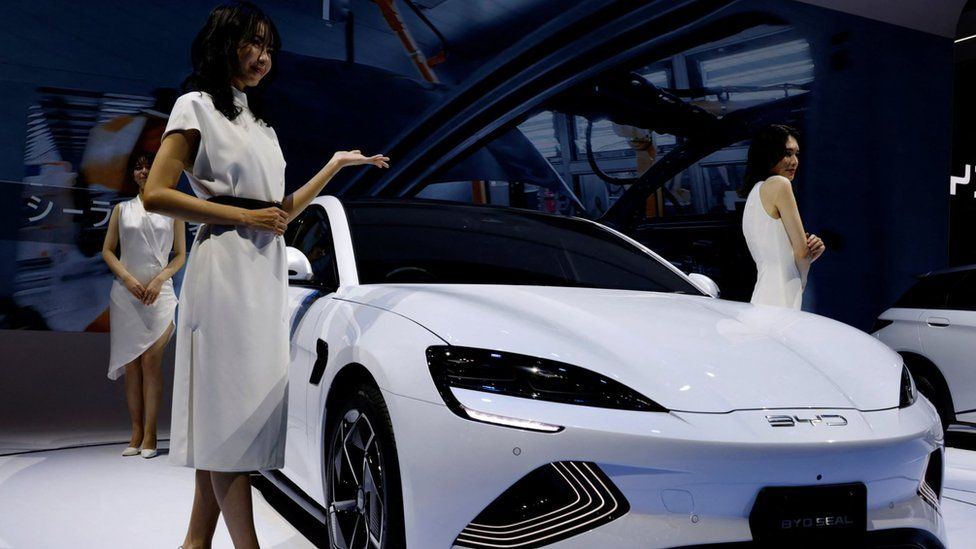China’s BYD overtakes Tesla’s electric car sales in last quarter of 2023
-
Published

Chinese company BYD sold more electric vehicles than Elon Musk’s Tesla in the last three months of 2023 as the two battled for top spot in the sector.
BYD said on Monday it had sold a record 526,000 battery-only vehicles in the final quarter of 2023.
It marked the first quarter its battery-only sales have outpaced Tesla’s. The US-based firm has seen demand slow as borrowing costs climb.
However, for the whole of 2023, Mr Musk’s Tesla still sold more.
On Tuesday, Tesla said it delivered a record 484,500 electric vehicles in the last three months of 2023 and 1.8 million for the year as a whole.
The end-of-year performance was better than analysts had expected, as sales rose 20% from the same period in 2022 and picked up pace from earlier in 2023. Analyst Dan Ives of Wedbush Securities described the quarter as a “clear win” for Tesla.
But it fell short of earlier hopes. Last January, Mr Musk said that Tesla had the potential to achieve two million deliveries in 2023.
The firm cut prices repeatedly to try to woo buyers.
The milestone achieved by BYD is a reminder of the challenges facing the firm, which helped to launch the electric vehicle industry.
“As BYD has accelerated into the fast lane, it’s fresh evidence of just how competitive the EV market has become and how hard it will be for Tesla to swerve back to head the pack,” said Susannah Streeter, head of money and markets at Hargreaves Lansdown.
For the year as a whole, Shenzen-based BYD sold more than 3 million so-called-new energy vehicles (NEVs), which includes battery-only vehicles and hybrids.
Almost 1.6 million of its total sales were battery-only vehicles, the firm said.
BYD’s chief executive Wang Chuanfu co-founded BYD with his cousin in Shenzhen in 1995.
The company made a name for itself as a manufacturer of rechargeable batteries – used in smartphones, laptops and other electronics – that competed with pricier Japanese imports.
It started selling its shares on the stock market in 2002 and diversified by purchasing a struggling state-owned car manufacturer, Qinchuan Automobile Company.
Since 2008 BYD has counted veteran US investor Warren Buffett’s Berkshire Hathaway as a shareholder.
Analysts say BYD owes its growth to its original business – batteries. They are among the most expensive parts of an EV and making them in-house saves BYD a lot of money.
Many of BYD’s competitors rely on third-party manufacturers for batteries.
BYD’s battery business helped to give it flexibility to cut prices sharply at the end of 2023, lifting sales, which jumped by 70% in December alone.
